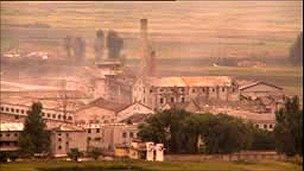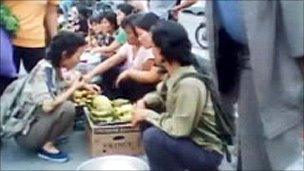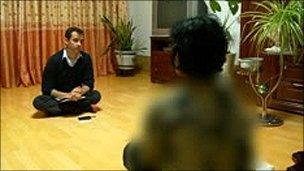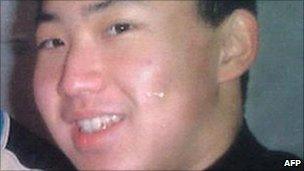Tales of starvation and death in North Korea
- Published

Across the Chinese border in North Korea there are no signs of electric lights, only dilapidated factories
In North Korea an extremely rare conference of the country's Workers' Party is to take place next week. The last time there was such a meeting was 30 years ago.
It's believed this meeting may be laying the foundations for a transfer of power from Kim Jong-il to his son Kim Jong-un, so preserving the Kim family's grip on North Korea.
Getting independent news from North Korea is extremely rare but China correspondent Damian Grammaticas has travelled to the border to meet North Koreans who have recently escaped.
Standing on a bridge that links their country to North Korea, Chinese tourists pose for photographs, laughing and jovial. In the distance you can make out dilapidated North Korean buildings. Everything looks crumbling and quiet, there's almost no sign of life.
One tourist, jokingly, takes a step over a white line painted on the ground, which marks the end of Chinese territory. He's shooed back by guards to more laughter.
North Korea may be an oddity, peered at from outside. But what's happening inside the secretive, isolated state is no light-hearted matter.
Near the border we met some of those who had recently escaped from North Korea. All told us that hunger and starvation are returning to their country.
"Recently people started dying. If there's no food people starve, " says a woman who we'll call Choi Young-hee.
"You see lots near the train stations. People without homes, they go there to sleep. Many of them die."
Choi Young-hee explains why she fled her homeland and her fears over its future
Mrs Choi is a grandmother in her 70s. A couple of months ago she paid smugglers to carry her across the heavily-guarded river that separates North Korea from China.
Her daughter also tried to cross, was caught and is now serving a three-year sentence in a North Korean political prison.
Mrs Choi says food shortages mean well-off families in North Korea are getting two meals a day, everyone else makes do with just one.
"We don't ask to wear good clothes, to dance or play. We only want full stomachs. But every day we wake up and our first thought is 'How are we going to get some food for breakfast?' Then 'How are we going to get something for dinner?'," she says.
"Living like that makes people go crazy. Just brush against someone in the street and they will start fighting you. In their hearts everyone knows we live like dogs. But no-one can say it out loud."
Crippled economy
Back at the Chinese border shops sell North Korean memorabilia to the tourists who come to gawp through telescopes at North Korea. There are military caps, postcards from inside North Korea, pictures of its despotic leader Kim Jong-il.

Secret footage shot at a market shows food for sale but few have the money to buy it
With conditions inside North Korea so desperate, many are willing to risk the border crossing in search of work and food. Lee So-ra, a 51-year-old mother crossed at the end of last month. She told us she saw people dying of hunger just a few weeks ago.
"Right before I came to China I saw a person, sitting outside a public toilet. I said 'Don't sit here go to the entrance of the market, maybe someone passing by will give you a candy or bread.'
"They said they didn't have enough energy. Two days later they died, right there. There are many people like that, so weak they starve to death," says Mrs Lee.
On the Chinese side of the border we drove along a muddy track winding along the river. Inside North Korea, Kim Jong-il is believed to be grooming his youngest son Kim Jong-un to take over to ensure power stays in the hands of the Kim dynasty.
From a viewpoint overlooking a North Korean city you can see tired, old factories belching smoke, but no electric lights and almost no traffic on the roads.
Disastrous economic policies have crippled the North's economy. Mrs Lee says she hopes the regime comes to an end.
She fears more hardships if Kim's son, who's thought to be 27 years old, takes over.
"Everybody is worried about it. We worry about how someone so young, will be able to be our leader, running the country, because he doesn't have the capability, he's a person without experience or skills."

Lee So-ra told the BBC she hopes the regime comes to an end
It is impossible for people to voice such doubts openly inside North Korea. If you do your entire family can be imprisoned.
A third woman, Kim Soon-young, who'd crossed to China recently, told us that ordinary North Koreans have been told nothing about Kim's son, even though he may soon be their leader.
"We don't know anything about him. I never even saw a picture of him until I came here to China," Mrs Kim tells me.
"We don't know what he looks like or what he's done. All I knew was that he is a three-star general and a new propaganda song came out about him."
Mrs Kim says the song is about the new general who will take North Korea on its next steps and care for its people.
But coming to China has, she says, opened her eyes to the way North Koreans are kept isolated, impoverished, starved of information and food, and so controlled by the Kim dynasty.
"Before I was thankful for everything, but after coming here to China I'm in shock. Our leaders live so well, if they just gave up a little of their wealth the people wouldn't worry about food," says Mrs Kim.
"But they only want to maintain their hold on power. They don't care about the sufferings of ordinary North Koreans. That's what I've realised."
Such open, angry criticism of the Kim regime is something you would not have heard a few years ago.
Choi Young-hee is bitterly resentful about the prospect of Kim Jong-un taking power.
"If we say anything about him being too young, we'll be arrested straight away. It makes me angry. I want to shout out loud.

Kim Jong-un would inherit a raft of problems, including a desperate and alienated people
"My daughter is going to die in prison. I want at least to scream and then die. But I can't because of my other children and relatives."
If Kim Jong-un takes over from Kim Jong-il, the inexperienced, untested young man, who has no political legitimacy other than his birth, will be at the helm of a nation with nuclear weapons and a raft of difficult problems.
North Korea has almost no real economy, widespread hunger, an increasingly desperate, alienated population, and tense relations with South Korea and America.
So Mrs Choi probably speaks for many, inside and outside her country, when she says she worries about North Korea's future.
"If Kim Jong-il fed his people even only with corn bread we wouldn't complain," she says angrily.
"But he's made us die, lose our homes, suffer. If his son now takes power I think it's dangerous, you wonder what will happen to North Korea. But inside my country I can't say a word."
- Published21 September 2010
- Published13 December 2013
- Published27 September 2010